


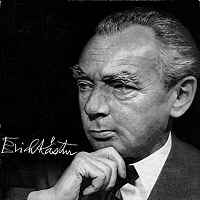

BOOKS
Hangman's Bill
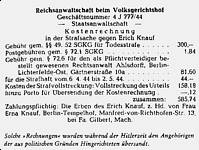
To establish the proper atmosphere, this is as good a place as any to show a sample of the bill you got for having your husband killed by the Nazis for political, or any, reasons. Yes, you were supposed to pay for the execution (or else...) It comes to a total of what now must be well over $6000. They even charged you 12 cents for the stamp to send you the bill.
For once, I've been lucky Dutch is my mother tongue. Kästner translates amazingly well to Dutch; his German is very Dutch-like and he still is very popular in Holland and also in Germany. I try to tell you more about him by quoting from his books, or re-telling what he has to say; and giving some more circumstantial detail where needed.
Let's start with a sample of his poetry (1930), so you will know right away where he was at:
Kennst du das Land, wo die Kanonen blühen? Do you know the country where the cannons bloom?
Du kennst es nicht? Du wirst es kennenlernen! You do not know it? You will get to know it!
You have to know this is a take-off on Goethe's
Kennst du das Land wo die Zitronen blühen?
And now, for a short biography with a selection of his very extensive work, interspersed with selections from it. (Why do I keep picking authors that turn out such enormous volumes?) I am the guilty one for the translations; mea culpa. It's no pie for someone who mostly speaks Dutch to translate from German to English; my consolation is it would have been worse if I spoke French. To name but a few. You can find a complete list of his works here, with English title translastions.
Kästner started out as a teacher and began publishing in 1920. He studied in Leipzig until 1925 (used his Dr. title but once, in fun; and this for a German); made his first visit to a foreign country with his mother in 1926 (Switzerland and Italy); moved to Berlin in 1927. First children's book: Emil und die Detektive. By 1930, when he published his first volume of poetry, he had written in many magazines and newspapers. That year Emil was turned into a play and a movie (screenplay by Kästner, Emmerich Pressburger and Billy Wilder). Next he published Fabian, Pünktchen und Anton (produced for the stage the year after) Der 35e Mai (The 35th of May) and Das Fliegende Klassenzimmer (The Flying Classroom). And in 1933, the Reichstag building was burned down and Hitler grabbed power. Kästner happened to be in Switzerland at the time.
Kästner nevertheless stuck around, which explains why you may never have heard of him before; and why he never got a Nobel prize for peace either. Some of those who, maybe wisely, didn't follow his advice, did get such fame and recognition. I myself feel he was right; you have to stick it out, or who else will?
Interestingly, I found a couple of lines in A Man Called Intrepid: The Secret War 1939-1945 by William Stevenson, London 1976, on this subject. It's worth it to quote them in full:"I [Chaim Weizmann] had to point out that not all German scientists were insensitive. I quoted Professor Willstatter, who, although the leading German chemist of his time, refused to be involved."Der Erich, like most good guys, was much too doubting and, thus, self-effacing for his own, and our, good. He was next banned for publication and his books were burned; mainly because of Fabian.
"[William] Stephenson shrugged. [...] 'He did not refuse. He ran off. That leaves the rest free to play'."
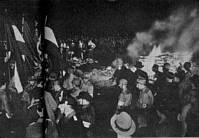
Berlin, Schloßplatz, 10 May 1933
I stood in front of the University, jammed between students in SA uniforms, the flower of the nation, saw our books lying in the flashing flames and listened to the sentimental tirades of the little consummate liar. Funeral weather hung over the town. The head of a smashed bust of Magnus Hirschfeld, on a long stake, swung up and down over the silent mass of people. It was disgusting.
Suddenly a shrill woman's voice called: "But that's Kästner standing there!" A young cabaret artist, pushing through the throng with a colleague, had seen me standing there and had given exaggerated expression to her astonishment. I became ill at ease. But nothing happened. (Although in those very days a great lot of things used to "happen".)
[Das Erich Kästner Buch p23]
He next published (in Zürich, Switzerland) Drei Männer im Schnee (Three Men in the Snow) and Emil und die Drei Zwillinge (Emil and the Three Twins) and was arrested in Berlin by the Gestapo.
Nevertheless, he went on to publish Die Verschwundene Miniatur (The Miniature That Disappeared), a bundle of poetry: Doktor Erich Kästners lyrische Hausapotheke (Dr. Kastners Lyrical Home Dispensary) and again got arrested for his troubles by the Gestapo in 1937.
Next year, after publishing Die Kleine Grenzverkehr (Small Border Traffic) he visited London but returned to Berlin—because of the war threat (how do you like this cat's chutzpah?)
Except for these men, wearing black breeches, riding boots and civil jackets, there was no human being in sight. The taxi turned into the Kurfürstendamm. Here, too, men were standing at regular distances and with long bars smashed "Jewish" show windows. Each one seemed to have some five to ten windows for a job. Cascades of glass fell down, crushing on the concrete. It sounded as if the entire town existed of nothing but crashing glass. It was a drive right through a madman's dream.
Between Uhlandstraße and Knesebeckstraße I asked to stop, opened the door and was just putting my right foot on the street, when a man emerged from the nearest tree and softly and energetically told me: "Don't get out! Drive on at once!" It was a man in hat and cloak. "But listen", I started, "I just wanted to…" "No", he interrupted threateningly. "Getting out is forbidden! Get on your way at once!" He pushed me back into the car, beckoned the driver, threw the door shut, and the driver obeyed. On we went through the ghostly "splinter night". In Wilmersdorfer Straße I made us stop again. Again a man in civilian cloth walked softly over to us. "Police! Drive on! Make it snappy!"
The afternoon newspapers carried the story that the boiling soul of the people, because of the government patience with the jewish businesses, had spontaneously resorted to self help.
[Das Erich Kästner Buch p26]
In the same A Man Called Intrepid I quoted before, Stevenson describes a counterpoint Nazi ploy: first, they would wait for the jewish shopkeepers to claim their insurance. Then, after the claims had been settled, the Nazis would confiscate those settlements.
Elsewhere Kästner tells how he asked the cab driver to stop for a third time, but the man had had enough and only wanted to take this maniac home. Later, after the night clubs had shut down, emerging prostitutes and gangsters looted the stores. As the newspapers in the Allied countries told it, the Nazis had incited the mob to ruin and loot the jewish stores. This still is the official historical view. It's all propaganda.
In 1942 he wrote the screenplays for UFAs jubilee production Münchhausen, Die Kleine Grenzverkehr, and Das Doppelte Lottchen (The Double Lottery Ticket, last two words a pun on a girls name, filmed at least four times; in Germany 1950; by Walt Disney at least twice as The Parent Trap; in England 1952 as Twice Upon a Time, in Japan 1952, title unknown); got banned for writing in Germany and foreign countries.
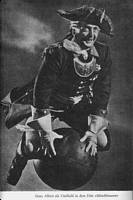
Hans Albers in Münchhausen, UFA 1942
In the opening titles of Münchhausen there was no credit given for the screenplay: when Hitler heard Kästner had written it, he flew into one of his notorious rages and had Kästners name taken off. As I see it, der Adolf was much too late. The movie had been finished and succeeded in ridiculing the 1000-year Reich idea. Almost nobody outside Germany and occupied countries has ever seen it, naturally. For a while I suspected it might have been burned by the American army after the war, like they did with Akira Kurosawa's first movie, Sanshiro Sugata. But it has finally become available. The plot-gimmick is that the notorious teller of tall tales Baron von Münchhausen in the course of his adventures acquires immortality, but in the end prefers to give that up and grow old gracefully together with his beloved.
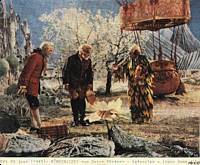
Münchhausen, left Hans Albers
Kästners house was ruined by bombing and there seems to have been some form of government compensation for war damages.
Talk about chutzpah!
Fighting the bureaucracy
Schriftumskammer = writer's chamber, of which every author had to be a member - no Jews need apply. The Nazis installed these and other chambers all over the occupied territories as well, and several still exist in Holland, that oho! so liberal country; well, after all they also kept the Autobahne, long after the war still fondly known to the Dutch as the hazenpad [hare's path] or take-to-your-heels path. Happily, and very decently too, Metro-Goldwyn-Mayer (the much abused Louis B. Mayer) had paid for the rights of Drei Männer im Schnee and Die Verschwundene Miniatur, even though they couldn't film the last one in the USA, as the author was a German. (You can't win.) Ironically, P.G. Wodehouse, who was not allowed to leave Germany, meanwhile lived in a Berlin hotel all through the war as he had so much royalty money coming in from Germany that he could afford it.
It is interesting enough in itself that Kästner was a member of the Schriftungskammer. Those Dutch artists that had decided to join the equivalent got into great trouble after the occupation ended: they had been fout (wrong)—these days, politically incorrect. A famous example is Amsterdam Concertgebouw Orchestra conductor Willem Mengelberg. Such simplistic judgements are often problematic.
Kästner went to Tirol with a UFA film crew, 1945. A word about UFA here. As the national film production and distribution unit, they got a very bad name in Europe and, for all I know, everywhere else. Were they not releasing Nazi propaganda all the time? Sure they did. But you already know they selected a blacklisted author to write their jubilee production; the same guy who wrote several other screenplays for them (under pseudonym), and UFA presented Hitler with the fait accompli. Before the war the German film industry was recognized as being one of the best in the world; Hollywood received refugees from there with open arms. In the Allied West Technicolor used B/W negative film and Kodak made Kodachrome (reversal color), while German technology was so advanced they had Agfacolour negative film. Indeed, in 1937 they had the world's first stereo-color-sound movie. Münchausen was a very lavish production, comparable with Gone with the Wind or The Wizard of Oz, and must have cost a fortune; Hitler couldn't afford to start all over again with a new jubilee film, if only time-wise. Nice coup, that.
At the end of the war, when they saw the Third Reich collapsing, UFA came up with the insane idea to make yet another Heimatfilm. It was set in Austrian Tirol, close to the Italian border, where they could confidently expect the Americans to show up first. This was the one for which they took Kästner along as their screenplay writer. They shot with empty cameras to fool the local Nazi officials, and kept the film material in stock for use after liberation. The beauty of the scheme was that Goebbels could not stop them, as the Nazi leaders wished to keep up all appearances that business was as usual.
The following quotes are from Notabene 1945, a book that never fails to give me goose-pimples. After the Allied armies have taken over, the population is ordered to show the Austrian flag:
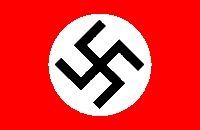
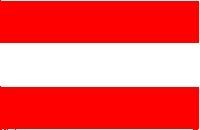
Everywhere the swastika was torn from the Hitler flag. Everywhere white bed sheets were cut up. Everywhere the farmers' wives stitched the red and white bars trimly together on their sewing machines.
[...] Darker patches on the walls told us how easily wallpaper fades and how large Hitler's portrait had been. In some living rooms the father of the family stood in front of the mirror, made strange faces and shaved, without any feelings of piety, his tertiary sex characteristic, the Hitler moustache, from his upper lip. [...] Now that the light shines out again, there is also light shining in.
About Hitler, the man you can still read about how, in private, he really was a very sensitive and cultured man, two authentic anecdotes, told to Kästner by Gustav Knuth and Otto Wernicke:At one of those receptions after a great parade, Hitler retreated to a small side room with an ambitious young actress and she, always with an eye on promoting her advantage, swung the incense burner until she became nauseous. He took better to the incense. When she didn't know what to say anymore she, in desperation, admired the perseverance and endurance with which he had kept his arm up during the entire parade. He was gladdened by her understanding, he became chatty and said (more or less): "I am really pleased you noticed that. I didn't have to put my arm down even once! And the parade lasted for three hours! Did you see Göring? He had to put his arm down at least five times!" Then he bent down over her, stretched his arm out and genially requested her to squeeze his biceps. She obediently pinched Hitler's Hitler-salute muscles, heaved delighted cries and he was as proud as a carnival wrestler. The other incident also deserves mention. As an invention, a fantasy, it would be a splendid idea for a satirical movie. [...] At one of those receptions, at the height of his power, Hitler wanted to show off how genial he could be. He had planned to greet one of the guests—a famous actress of whom was known she did not like the regime—with a handshake instead of with raised arm. The actress, from her side, had planned to raise her arm, to avoid sensation and complications.
The scene following is straight from Charlie Chaplin's The Great Dictator when "Napolini" meets "Hynkel", where they alternately stick up arms and try to shake hands. Talk about "satirical movies". Shows you the genius of Chaplin, and the goddam shame of the USA banning his movie because Hitler must not be alienated, or some such asinine reason. Much damage and sorrow could have been avoided had that other Great Man, Roosevelt, decided otherwise. "I've said it before and I'll say it again: Show me a magistrate and I'll show you an ass." (P.G. Wodehouse, The Code of the Woosters.)
Once the Americans had arrived, they started hassling Kästner. Had he not been visiting neutral Sweden and Switzerland during the war, and why had he not staid there? Pretty suspicious, that!
After liberation he moved to München, started a cabaret; published several books and wrote another play. Picture book Die Konferenz der Tiere (The Conference of Animals), for children; and novel for children Das Doppelte Lottchen. Started another cabaret 1951; novel for children Münchhausen. Movie Das Fliegende Klassenzimmer; book Die Schildbürger 1952. Die dreizehn Monate (The Thirteen Months), poems, 1953.
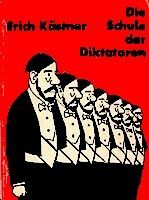
Die Schule der Diktatoren (The School for Dictators), 1956; play about training school for dictator-doubles (in Iraq they seem to have picked up this hint and there was a theory that only doubles of Sadam Hussein had been appearing in public since 1998); picture book Don Quichotte; Als ich ein kleiner Junge war (When I Was a Little Boy). Finished Notabene 1945 on the final months of World War II, 1960. Upon severe ischias attack in 1961 was hospitalized in München where tuberculosis was diagnosed. Published Gulliver rewritten for children. Spent several periods in a sanatorium. Screenplay Der Liebe will gelernt sein (Love Wants to be Learned), 1962. Der Kleine Mann (The Little Man and the Big Thief) novel for children. [The biography I have stops in 1966. It was written by his wife Luiselotte Enderle]. Kästner died in 1974.
To finish, the one image (from Notabene 1945) that really catches the sad insanity of war. And these things still go on and on:

Erich Kästner
books & movies
(in English und auf Deutsch)
Münchhausen



still more

SEARCH this site or the Web

copyright notice
all material on this site, except where noted
copyright © by harrie verstappen , curaçao
reproduction in any form for any purpose is prohibited
without prior consent in writing